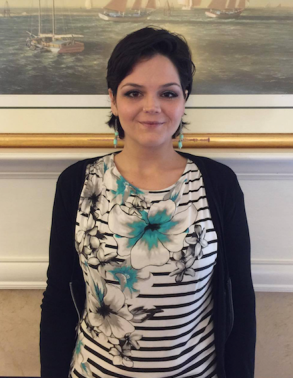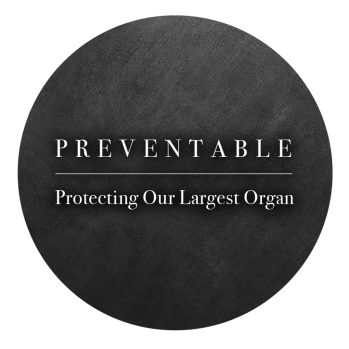 Robin Winkler
Robin Winkler
Sugar Hill, GA
“…and never could I have known the taste of heaven, had I not swallowed the pieces of hell, first.”
1.When did you start using topical steroids? And why?
I was first prescribed topical steroids when I was 17 months old- I had an allergic reaction to detergent in some clothes my mom was trying on me.
2. What was the name of the topical steroid?
I started out using triamcinolone- the pharmacy would mix it into Aveeno or Eucerin for me. I remember that my parents would put it all over my arms and legs every night.
3. Were you ever prescribed more potent steroids?
As I mentioned, I had a nightly routine with my triamcinolone. It never stopped once it started, and became a norm for me. When I was about 10, however, my face started showing signs of ‘eczema’ so I was prescribed a different steroid called desonide for my face. Over the years, my eczema slowly consumed my entire body, and I would keep it at bay with triamcinolone, desonide, fluocinonide, mometasone furoate- you name it, I have probably been prescribed it. I also tried alternatives to topical steroids, such as Protopic or Elidel.
4. How did you find out about RSS?
I found out about RSS in May of 2015. I had a one year old, was working full time, was stressed, and I had used oral steroids for my skin. I actually got the shingles and then of course, more steroids. After the shingle was gone, I had a particularly bad flare, and none of the steroid creams were helping- not even the really, really, strong ones. So I googled “the steroids don’t help my eczema anymore” and it led me to ITSAN.
5. What made you feel you had RSS?
I observed the TSW/ITSAN Facebook groups and researched for a long time before I was determined this was indeed my same affliction. What I couldn’t ignore was the obvious rebound effect after stopping steroid use- and it was classic, and my skin matched every picture on the ITSAN site. The Red Sleeves are not something I have ever had with my original eczema. On top of all of these things was the fact that my original eczema had never affected these areas of my body before
6. Were you diagnosed by a doctor? Did you have a supportive doctor?
I was diagnosed by a dermatologist with ‘steroid dependent eczema’ – which at least meant she recognized that I needed to stop using them. She was key in helping me come off of the steroids, but the only way to do so was to use an immunosuppressant- basically, a drug that people take when they have organ transplants to keep their bodies from rejecting the new organ. I eventually sought, and am still working with, a naturopathic doctor. He has been immensely supportive, calls my condition TSA (topical steroid addiction), has helped me find the root cause of my original eczema, and has even helped me do research about topical steroid addiction.
7. What were your first symptoms?
I had been on oral prednisone for the shingles and topical steroids for my eczema; as soon as I ceased using them, my skin peeled and cracked and was just so tight and dry. That was immediate too- within 24-48 hours of stopping. One week into stopping, and my skin was not only tight and dry and flakey but simultaneously oozy and waxy and hot – my face swelled, my entire face, neck, chest, arms, legs- all turned bright red and there was an unbearable nerve pain. Like a million razor cuts in every square inch of your skin, or a million fire ants biting all at once. It was basically a cycle of hot, red, oozy skin to the crusty, scabby, painful skin, then to flaky skin that fell off everywhere…and then back to square one with the intense inflammation.
8. Is your family supportive? Friends?
My mom and my brother have been amazing. I am a single mom, so when this started and I realized I wouldn’t be able to work, I moved in with my mother. She has paid for medical expenses, taken on the duty of caring for me when I couldn’t even take a shower. She has helped me with my son, and helped me financially as well. I know it has been a huge strain on every aspect of her life. Friends who have little knowledge of eczema or RSS in general are supportive, but wary. They don’t understand why I don’t use steroids or why I needed so much help from my mom, and can be quick to judge or criticize. I worry people will see me as entitled or lazy, since they have no idea what’s really going on.
9. Have you ever been to a hospital for this?
I went to the ER on 1/29/2016. My scalp was green and yellow and bloody, my skin was peeling and cracked and bleeding from my scalp to my toes. I couldn’t eat. I couldn’t sleep. I couldn’t shower. I couldn’t even think straight because the pain was unbearable. My brother says I’m a tough cookie, so he knew that this was serious when he saw me crying from pain. It takes a lot of pain to make me cry.
10. What has been the hardest part of this condition?
This is a tough question. Ask me the easiest part. HA. From one aspect, just not being able to LIVE in any measure of the word has probably been the most difficult part to adjust to. I was working full time, I took my son to daycare and picked him up-everything, on my own. Once RSS took over, I couldn’t even do the dishes. The other part that was/is infuriating is the lack of knowledge and research about RSS. I joke that everyone going through this is like a lab rat, because we have to find out what works for us since there are no medical guidelines, much less real recognition from the medical community. The stress is also a lot- there were days I wanted to crawl into a box and literally die. There was financial stress- I couldn’t contribute to my own life or my sons life, and living costs money. I tried to get on disability several times (temporarily) but was never able to. There was emotional stress- I vividly remember lying in bed, in a lot of pain, and thinking, why should I be still and do nothing if its STILL going to hurt?? Again, naming the hardest part of this isn’t easy.
11. How long have you been in withdrawal?
I started my withdrawal 8/12/2015. I would say I am about 14 months in, but I have used oral steroids during this time though, for asthma, and an anaphylactic reaction I had. I would not say that I am completely healed, but I am now about 85-90% better.
12. What do you use as comfort measures during this?
In the early stages, apple cider vinegar baths and zinc oxide paste (like desitin for babies) were life savers. As time went on, I was able to tolerate sea salt baths, and oatmeal baths. I really liked hydrocolloid bandages for very raw and deep wounds, as well as elaj (a highly concentrated oatmeal cream). As far as mental measures, I actually sought a health coach who helped me with stress management and meditation.
13. Are you employed? Has this affected your job status?
I was. I stopped working as a medical assistant purposefully so I could start my withdrawal. As I mentioned, though, I am a single parent so I tried to hold down a couple different odd jobs in the beginning, and I couldn’t. I’m hoping to return to work soon…
14. Have you gone to therapy/wish to go to therapy because of this condition?
As I mentioned, I did enlist a health coach for 10 weeks. Now that period is over, however, and I find myself wishing I could utilize her again. So, yes, I think therapy would be helpful. To be honest, I’m still scared that I will wake up one day, full flare, back at square one with no eyebrows and hot painful skin everywhere. It kind of keeps me from diving fully back into my life just yet.
15. If there is one thing you could say to another sufferer, what would it be?
It’s hard to narrow my advice down to one pointed piece. I would say, take pictures. Even if you don’t share them on social media; keep them for yourself. I wish I had taken more. Also, I think a lot of this journey is hard because we feel like we have lost ourselves and any sense of a ‘life by OUR design’- but please, remember, you are still there and you are still YOU. The most important thing during this journey is to truly invest in yourself, even if you cant take time off work- don’t’ obsess over what other people will think. Take it one day at a time, one minute at a time, or one second at a time. Get through it however you have to- remember no one’s journey is the same and the only real goal is to restore health to our bodies without steroids.
Thank you so much, Robin! You’re interview was inspiring!
